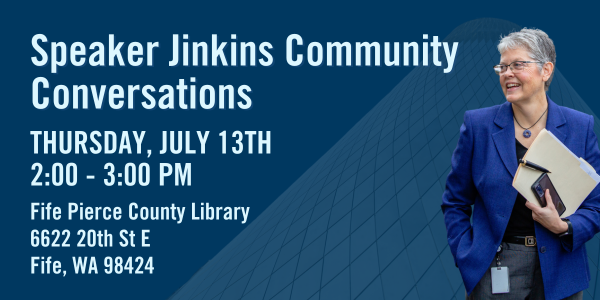Dear friends and neighbors,
I’m back with another update on what we were able to accomplish this session! As many students are wrapping up the school year or preparing to graduate, I thought it would be fitting to talk about the work we’ve done to help people take their next step in life, whether that be post-secondary education, apprenticeships or some other form of workforce development. This is especially meaningful for me this year as I’ll be heading up to Bellingham in the next few days to celebrate our son’s graduation.
Educating our students is one of our state’s highest priorities. It’s an investment in our future, from growing individual economic stability to creating a workforce that meets Washington’s needs. These topics were a big focus for us this year, and I’m excited to share more about our work.
I also wanted to let you know that I’ll be hosting community conversations across the district over the next couple months. These are intended to be small group discussions so please stop by to ask questions or talk about issues that are important to you! My first stop is Thursday, July 13th, 2:00-3:00pm at the Fife Pierce County Library, and I’ll be joined by Rep. Fey. I’ll keep you posted about other dates, times, and locations!

–

This session we looked at ways we could make post-secondary education more accessible for all students in our state. From expanding access to increasing financial aid, we want to make sure every student’s post-secondary education goals are within reach.
That starts in K-12, where we expanded access to the running start program, which allows high school students to attend classes at our community college and four-year institutions, and eliminated fees for College in High School courses. These dual credit opportunities help prepare students for post-secondary education and allow them to get college credit for coursework before they leave high school. We also passed legislation establishing regional apprenticeship programs which gives high school students the opportunity to learn valuable skills that lead to good, family-wage jobs.
We expanded the Working Connections Child Care program to first-year apprentices, helping make childcare more affordable for families with lower incomes and making it easier for more people to enter the trades. We also passed legislation that will boost the use of apprentices in public work contracts, which will help us attract and retain the next generation of skilled workers.
Additionally, we expanded access to the College Bound Scholarship, helping more students access a degree or credential. Half of all students in Washington state experience food or housing insecurity, this year we set up a program to help connect students with the resources they need, including access to meal vouchers. These support services help students focus on their coursework instead of where their next meal is coming from or where they’ll sleep that night.
In addition to these investments we also expanded the Washington College Grant by $13 million, ensuring more students can get the degree, credential, or apprenticeship they want without taking on debt.

Our post-secondary education investments go hand-in-hand with our investments in workforce development. Every sector in Washington has been impacted by workforce challenges, from behavioral health to childcare, long-term care to K-12 education, public safety, and more. This session we invested $382 million in the future of our state though post-secondary education and workforce development.
We also know that we need to act now to help address our current workforce shortages. That’s why we passed legislation to enter interstate compacts or remove licensing barriers for dental hygienists, audiologists, and mental health counselors. These interstate compacts will make it easier for people who move to Washington to get working right away, and are particularly important for our military families (we also passed another bill specifically helping military spouses obtain professional licenses when they move to Washington state).
We also passed legislation to help us track supply and demand in the healthcare workforce, giving us the data we need to better serve communities across the state and plan for the future. We also acted to address our homecare worker shortage, grow our behavioral health workforce, and remove barriers in hiring paraeducators. Additionally, we dedicated $48 million to health care workforce development and training in our operating budget.
These changes work with other investments we made to increase wages for health care workers like behavioral health providers, primary care providers, pediatricians, and more.
